
Updated Aug 8, 2022
As a first-time homebuyer, you may be looking for ways to save on long-term costs. One way you may be able to generate savings on your home insurance costs is by installing a home security system.
A burglary occurs in the U.S. approximately every 15 seconds, amounting to more than 2.2 million total burglaries. A home without a security system is much more likely to be broken into than a home with a security system. Insurance companies exist to provide you the protection you need for your home. They understand you can add another layer of protection to your property and create a safer home for your family by installing a monitored home security system.
While a home security system may add more protection to your home, is it worth the cost? Can a home security system lower insurance costs? Can you get home insurance with a free security camera? This guide will provide the essential information you need to know about home security systems and homeowners insurance.
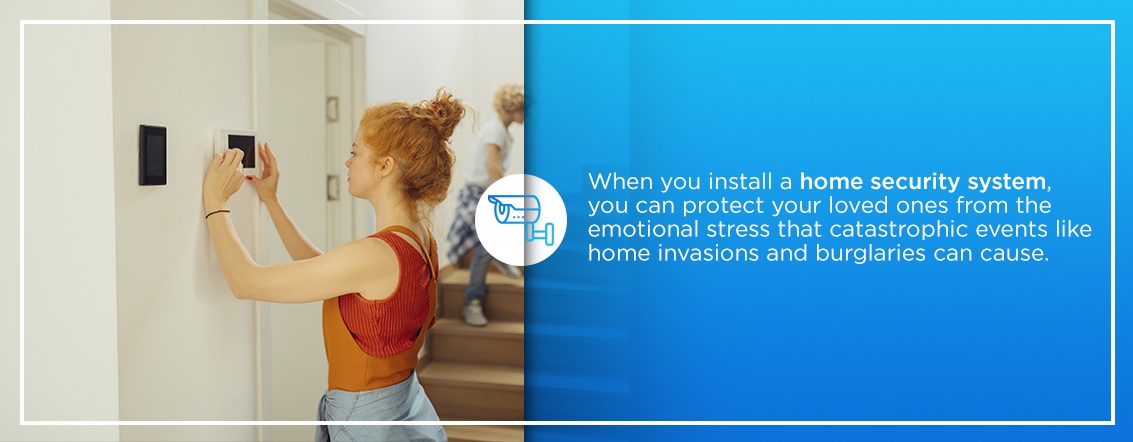
Typically, purchasing monitored security systems reduces the cost of homeowners insurance. In fact, several insurance companies offer discounts when their policyholders purchase home alarm systems.
When you install a home security system, you can protect your loved ones from the emotional stress of a catastrophic event. While no homeowner wants to think about their home getting burglarized, the reality is that any home can be a target. Since 1990, the burglary rate in the U.S. has steadily decreased. However, in 2021, there were still an average of 314.2 burglaries per 100,000 people.

Typically, purchasing monitored security systems reduces the cost of homeowners insurance. In fact, several insurance companies offer discounts when their policyholders purchase home alarm systems. Insurance providers recognize that security systems are an effective deterrent for criminals. Homeowners often display signs in their yard and stickers in their windows, establishing they have an alarm system. If a criminal sees this, they will be less likely to attempt to enter the home.
When you install a home security system, you can protect your loved ones from the emotional stress that catastrophic events like home invasions and burglaries can cause. The best way to handle a burglary is to prevent it in the first place, and homes with security systems are less likely to be broken into.
Review your next itemized mortgage bill to see how much you really pay for monthly homeowners insurance. If you want to take advantage of savings wherever possible, consider installing a security system to lower your insurance premiums.
ents like home invasions and burglaries can cause. The best way to handle a burglary is to prevent it in the first place, and homes with security systems are less likely to be broken into.
The following are the ways you can lower your insurance costs with a home security system:
Since a home security system reduces the risk that your home will be burglarized, there is less of a chance you will need to file a claim with your insurance provider. Lowering the number of claims saves your insurance company money, which means they can pass on the savings to you through a discount on homeowners insurance for an alarm system.
If you have recently purchased a security system, ask your insurance company about discounts. You can review the declarations page on your homeowner’s policy to find out exactly what type of coverage you have and your eligibility for certain discounts, including those for having an alarm system.
Additionally, you may see a drop in your insurance premiums after you install a home security system. Home insurance premiums are affected by your coverage level and risk level. With a home security system, you decrease your level of risk and your insurance company may lower your premiums.
The discount you receive from your insurance provider will depend on the amount of protection you have. Some homeowners can save up to 15% on their insurance premiums when they acquire alarm systems and install additional security measures. This could result in a savings of up $100. The most common discount insurance providers offer sits around 2-5%.
If you install a system with other safety features, such as deadbolts, fire extinguishers, a smoke alarm or a sprinkler system, you can provide additional protection and possibly lower your insurance premiums.
The average homeowner’s insurance premium for American families is $1,272 a year. So, if you install a basic security system with an alarm, a few extra deadbolts and update locks on your windows, your insurance provider might offer a 5% discount. Then, you would save around $63 a year, or $5.25 a month.
However, if you opt for an advanced smart home security system with 24/7 remote monitoring, motion detector lights and install a sprinkler system in your home, your provider may increase their discount to 15%. If you’re paying the average annual premium, that’s a savings of around $190, or $16 a month.
Based on the two examples above, investing in an advanced system can result in more long-term savings. So, in addition to getting better protection and peace of mind, you save money.
By purchasing and installing a comprehensive home security system, you may be able to reduce the risk of your insurance costs rising. Over the long term, this can save you money and help you budget your expenses related to homeownership by keeping them more consistent from month to month.
As a homeowner, you are already facing several major expenses, which means you may want to cut costs wherever possible. We recommend homeowners install a home security system for the safety features, the peace of mind and the reduced premiums on their homeowners insurance.
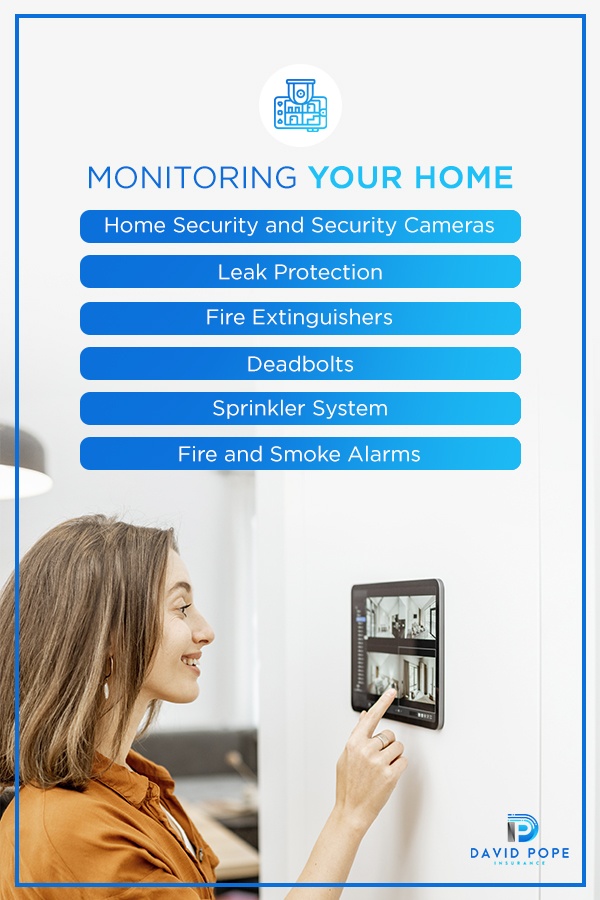
Many homeowners occasionally forget to closetheir garage doors or lock their front doors before bed, which can put the security of their homes at risk. Under your homeowners insurance policy, the contents of your home may not be covered. Fortunately, with a smart security system, you can monitor your home, lock doors from anywhere and get alerts sent to your phone when your garage door has been left open.
The savings on your home insurance premium when you install a security system depend on several factors. To receive a discount from your insurance company, most providers require that the home security system is professionally monitored. The following features can help you obtain the greatest amount of savings on your home insurance:
One way you can save money on your home insurance is by installing security cameras in your monitored home security system. Security cameras that feature 24/7 video monitoring can be an especially effective way to save on your insurance.
If you purchase your home security system from an alarm company, they may provide a certificate as proof of the system that you may need to show to your insurance company.
Another way you can save money on your insurance is by purchasing a home security system with leak protection. This feature helps detect gas or water leaks, which can save you money by providing additional protection.
You may want to purchase sensors that can send notifications to your phone if a leak is detected. This may allow you to address the leak before it causes damage to your home. Other sensors can automatically turn off the water to prevent flooding, which can be particularly valuable since floods are not typically covered under a homeowners insurance policy. The water sensors, central hub, valve and mobile app all work together to keep you in control and help protect your home.
These leak protection sensors can save you quite a bit on your homeowners insurance premiums in addition to 24/7 protection.
You may be able to save money with your monitored home security system by including fire extinguishers on each floor of your home. Fire extinguishers can allow you to put out a fire as soon as it occurs and limit the damage to your property.
Along with every floor of your home, you may want to include fire extinguishers in your kitchen, garage, bedrooms and near any sources of heat, such as a fireplace. Keep the fire extinguisher near the source of heat, but at a safe distance rather than right next to the heat source.
You may also get a discount on your home insurance if you include deadbolts in your monitored home security system. Installing deadbolts on each of your exterior doors makes it more challenging for a burglar to break in. This protection lowers your risk for home invasion and theft, which can also lower your home insurance premiums.
Some policies also have specific requirements to qualify for the discount, such as the number of deadbolts needed or having systems with smart locks and keypads or facial recognition.
Another way you can save money on your home insurance is by purchasing a monitored home security system that includes a sprinkler system. A sprinkler system is the fastest way to put out a fire, so when you install a sprinkler system on every floor in your home, you can add an additional layer of protection for your property. You can hire a contractor to install the sprinkler system or make it a DIY project for you and your family to tackle.
Finally, you can save money on your homeowners insurance by installing a monitored home security system with fire and smoke alarms. Many monitored fire and smoke detectors send notifications to your phone when fire or smoke is detected. You may want to install these alarms on every floor. When a fire alarm connects to an outside monitoring service, it may speed up the arrival time of fire personnel.
If you are unsure which of the available features will be most beneficial for your home security system and will maximize your savings, you can reach out to your insurance agent to discuss discounts.
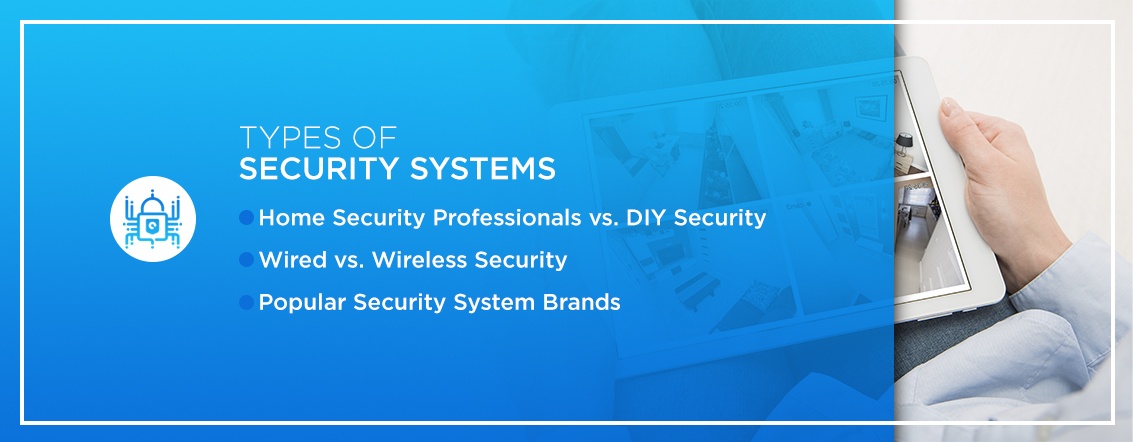
If you live in a gated community, you may also be able to benefit from insurance savings. There are a few different types of these communities, which may result in differences in cost savings. On one end of the scale, a gated community might just be one with a single entrance and exit. While unmonitored, having only one way to access the neighborhood can reduce crime risk.
More secure gated communities might include those with passkey gates, 24-hour security patrols or 24-hour manned security gates. If you live in one of these communities, you might be able to take advantage of even more savings.
Because there are so many types of home security systems, you may have trouble choosing which is the best for you. To make your decision easier, you can learn about and narrow down your options. You can choose between a DIY security system or a system installed by professionals and a wired or wireless security system. You can also choose from several popular brands that offer home security systems.
Do you want to have your home security system installed by professionals, or do you want to tackle the project yourself? To help you decide which option is right for your home, ask yourself the following questions:
If your home security system is installed by professionals, you can rest assured your system will be installed properly. Professionals will also handle maintenance on the system, and a technician can answer any questions you have about the security system. A downside to having your security system installed by professionals is that you will typically need to sign a contract and pay an installation fee. You may also end up buying more equipment than you need.
If you choose to DIY the security system installation, you likely will not be required to sign a contract and will typically pay less to monitor your home. If you move or rent often, you may want to complete the installation process yourself for savings and convenience. However, if you DIY install your system, you will have to pay for the equipment upfront and you run the risk of improperly installing the system. You may also be responsible for all the repairs to the system.
Your decision will ultimately depend on your budget, expertise, availability and security system.
Should you choose a wired or wireless home security system? Each type of system has its pros and cons. A wireless system is easy to install and comes with no monitoring fees. You can also select the settings you want, such as cameras, sensors, motion detectors and beams. If you choose to buy a wireless alarm system, you can purchase it from your local hardware store.
A wireless security system also has its disadvantages. There is a limit to how far apart sensors and cameras can be, and you may have to replace the batteries frequently, which can become expensive.
With a wired security system, the system equipment is connected via wires. This wiring will connect your cameras and sensors to your landline telephone system, direct subscriber line (DSL) or fiber optic cables for communication purposes. In contrast, a wireless home security system communicates throughout your home via a cellular network. When it comes to savings, if your goal is to reduce your insurance premiums, you should opt for professional installation. Most providers will not offer discounts for DIY-installed security systems.
How much your home security costs may depend on the brand you choose. Insurance companies may offer greater discounts if you purchase your home security system from a popular brand that includes features to lower risk. The following are some of the home security companies you may want to consider purchasing a home security system from:
Compare the different systems popular brands offer to determine which may provide the best features for your home’s security and insurance savings at the most affordable price.
The costs of a security system include equipment, 24/7 recording, professional monitoring and monthly costs, along with installation and activation fees. Each of the specific costs will vary depending on your security provider.
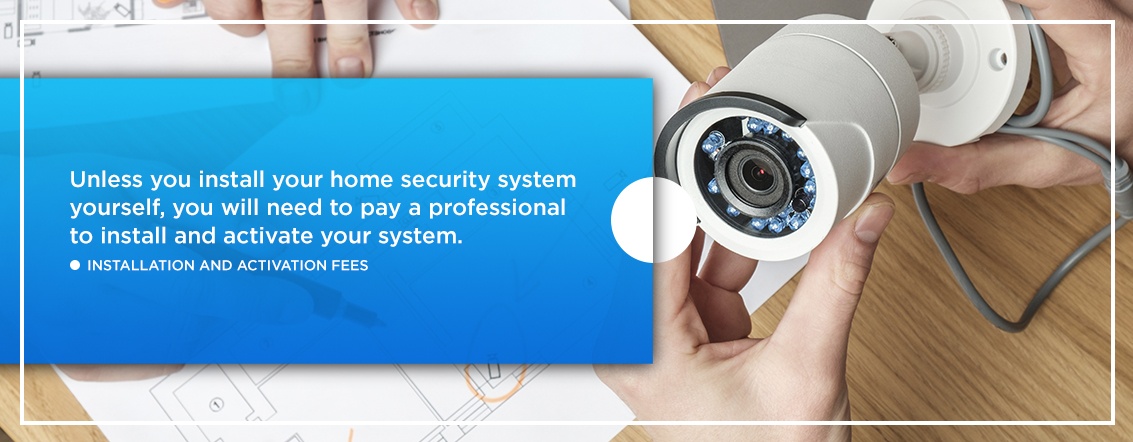
The cost of your alarm system is impacted by the installation fee and the activation fee. Unless you install your home security system yourself, you will need to pay a professional to install and activate your system. If you choose to skip the professional service to avoid these fees, keep in mind that installing the security system will cost you your time. Further, if you install your system incorrectly, you may need to pay a professional to correct the errors.
When weighing different system options, you may want to ask about activation fees, when you will need to pay these fees and if all equipment is covered by these fees.
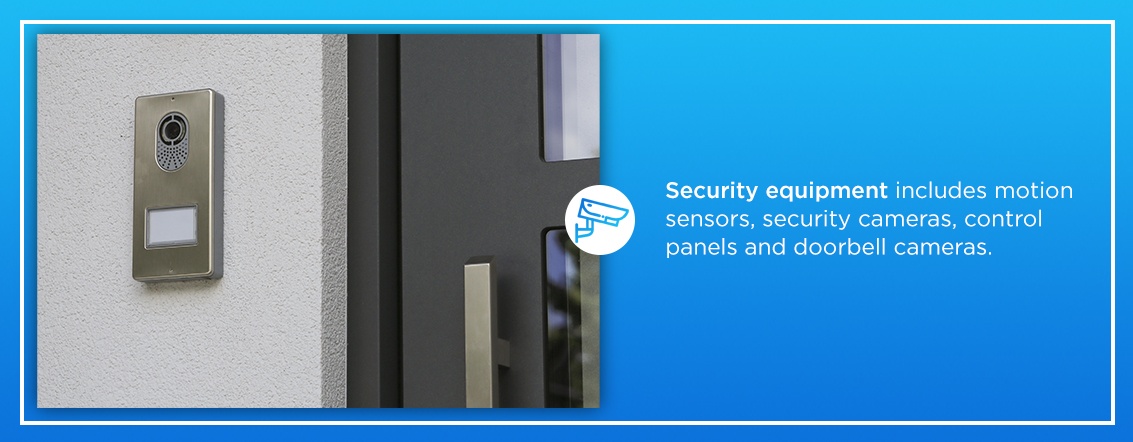
Your equipment is a major factor in the cost of your home security system. Security equipment includes motion sensors, security cameras, control panels and doorbell cameras. You can purchase your equipment upfront or lease the equipment from your security provider and pay monthly. Many security providers offer discounts to reduce the price of upfront equipment costs.
After setting up your security system, you may want to add extra security sensors or cameras to monitor any blind spots that are out of range. Additional equipment is usually inexpensive, and you may be able to purchase extra equipment at a discounted rate. Be sure to ask about any fees for additional cloud storage as well.
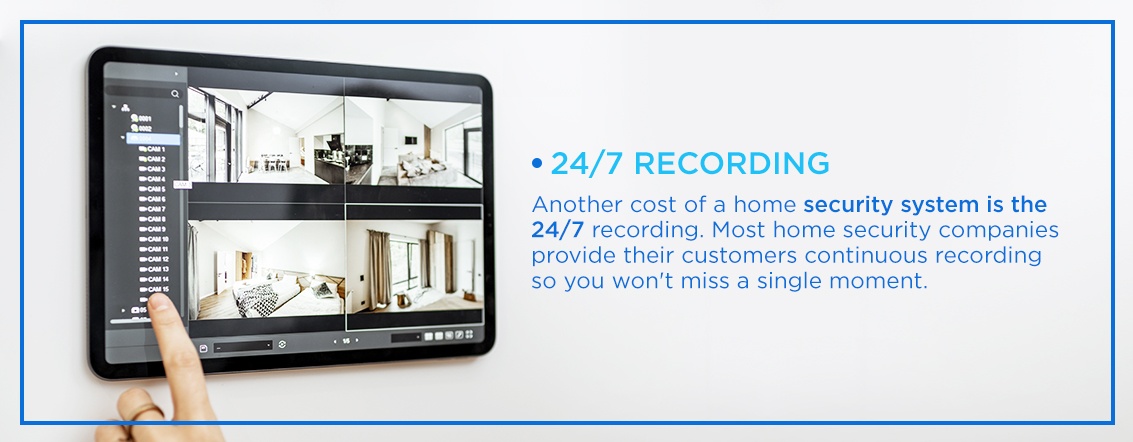
Another cost of a home security system is the 24/7 recording. Most home security companies provide their customers continuous recording so you won’t miss a single moment. Security cameras typically record only motion-triggered activities, which last for just a few minutes. You may be able to obtain a continuous video recording (CVR) plan for a week to a month.
The cost of a home security system also includes monthly costs for 24/7 professional monitoring. This includes having a trained professional monitor and handle your security threats around the clock. When you purchase professional monitoring for your home, you will be charged monthly and you will likely be required to sign a contract. However, you may be able to sign up for a month-to-month plan.
Fortunately, the costs for a home security system may be offset by the insurance discounts you receive. This means your insurance discount may significantly lower the net cost of your alarm system. How much your home security system will cost depends on the insurance discounts you will be eligible for and what your security provider charges for every service and feature you select.
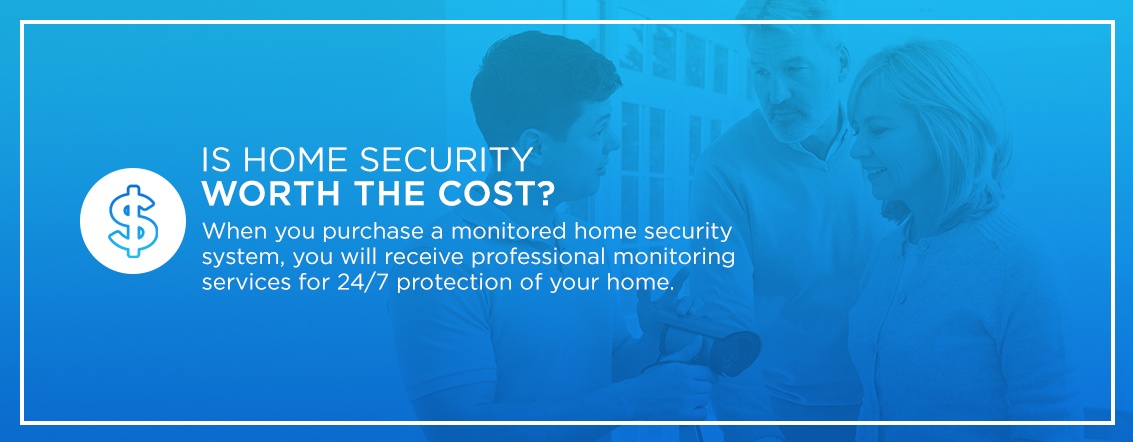
When you purchase a monitored home security system, you will receive professional monitoring services for 24/7 protection of your home. In the event of a burglary or fire, sensors will be triggered and both you and emergency responders will be alerted about the danger to your property. The most basic monitored home security plan can be purchased at an affordable monthly price. The plan that is right for your home depends on your security needs. The more features your home security system has, the more expensive the plan will be.
If your sensors detect danger, you will be contacted first by your professional monitoring service. After you have been contacted by your security provider, they may contact the emergency responders. With an unmonitored system, you will be notified when a sensor detects danger and you will be the one to determine whether you need to contact emergency services. If you choose a DIY home security system, your upfront costs may be higher, but your monthly costs for a professional monitoring package may be lower.
Regardless of how much a home security system will cost, you’ll want to consider how much the system will save you on your home insurance. With a high-quality security system, the benefits could outweigh the costs. Not only will you save money on your insurance, but you will also gain more peace of mind. When it comes to protecting yourself and your loved ones, a home security system can be an invaluable investment.
Are you looking to protect your home in Missouri and save on home insurance? At David Pope Insurance, we can provide you home insurance that offers the protection you need. We can also offer burglar alarm savings on insurance you purchase from us.
We are a family-owned, local insurance provider who understands you have insurance needs specific to your situation. At David Pope Insurance, we strive for flexibility in the coverage options we offer. This is what has led to us to be considered one of the most highly respected brokers for insurance in Missouri.
Say goodbye to waiting for days for an accurate insurance quote. When you choose David Pope Insurance for your home insurance needs, you can learn what options are available to you within a matter of hours. We can provide an excellent policy at an affordable premium that protects your home without breaking the bank.
Ready to purchase homeowners insurance to protect your home? Request a quote from us at David Pope Insurance today.